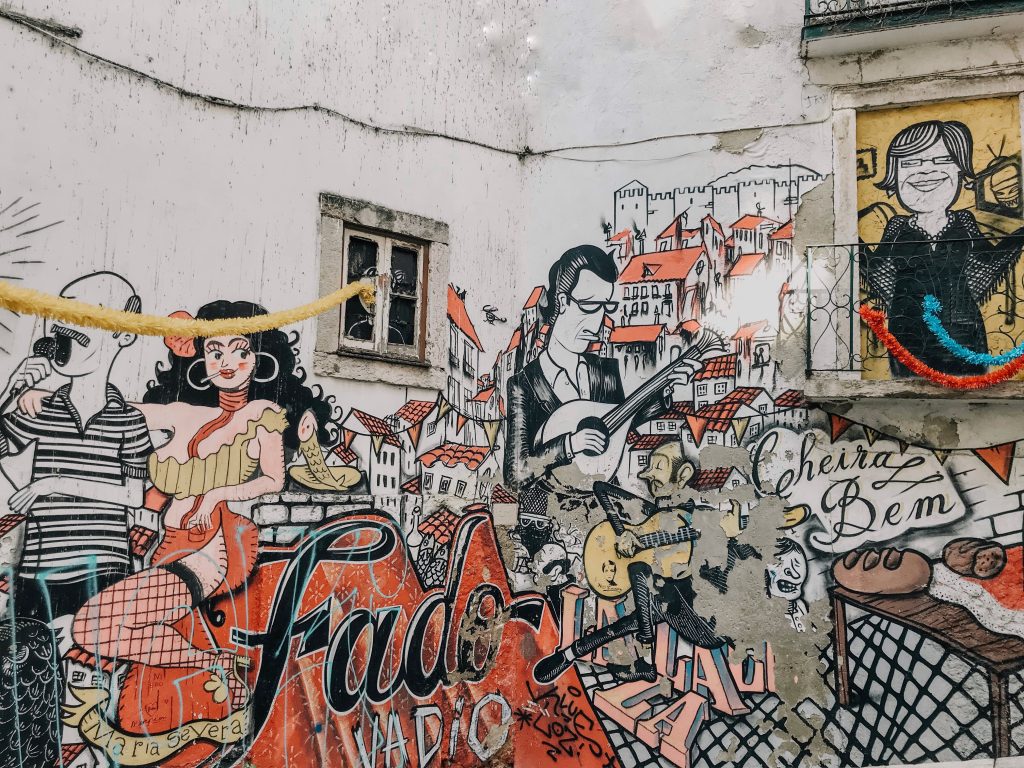Weathered wooden tables and chairs narrate tales of bygone years. The walls adorned with vintage black-and-white photos. Through the open window, the mild evening breeze carries the hum of the street. Fado’s melody resonates through the air, skillfully played by musicians investing their heart and soul in each note. Fado, crooned by Fadistas, finds its home in snug, intimate spaces like this – nowhere else. You must grasp this to fathom the music.
It’s not just the singer’s voice that stirs a profound sense of yearning, melancholy, and nostalgia; it’s also the timeworn ambiance, the images adorning the walls, and the patrons in the eatery. Nostalgically, we reminisce about days gone by.
Experience Fado’s finest
Listen beforehand! Preferably while reading. We’ve crafted a playlist, transporting you to Lisbon’s evocative lanes, where emotions run high, and ‘saudade’ is in the air. We’ll delve into the meaning of ‘saudade’ shortly. For now, enjoy this musical journey with Portuguese artists like Ana Moura, Camané, Mariza, and, of course, Amália Rodrigues.
Saudade: The profound emotions of Fado
In Portuguese, there’s a single word for the mix of longing, melancholy, and nostalgia: ‘Saudade.’ It’s not just a word in Portugal; it’s a deep, intricate sentiment ingrained in the culture. Frequently characterized as an indescribable yearning for something lost, a nostalgia for a time, place, or person that’s beyond reach. It embodies a sense of unfulfilled desires and poignant memories.
Saudade traces its origins to the era of Portuguese explorations. This term is linked to Portugal’s maritime legacy, encapsulating the ache of absence, whether of people, places, or moments. It articulates profound homesickness and melancholy, echoing the sentiment people experience when reminiscing about what they’ve left behind. This sentiment is palpable in Fado music.
Fadistas sing with a deep sense of saudade, and their voices convey the weight of loss and longing. The music is filled with these emotions, immersing the audience in a whirlwind of feelings.
Camané: Contemporary Master of Melancholy
Camané is a fadista adept at expressing profound emotions of yearning, loss, and melancholy through his velvety baritone voice. Introduced to Fado through his parents’ record collection, Camané started singing in his teens and emerged as a standout figure of his generation. A male artist excelling in a predominantly female-dominated genre, he has achieved remarkable success with six million albums sold in Portugal, a country boasting a population of about 10.5 million.
All the more reason to give him a listen, especially considering his appearance on NPR’s Tiny Desk concerts, one of our preferred musical video series on YouTube.
Tiny Desk – Camané
The Birthplace of Fado in Lisbon
Fado is a symbol of Portuguese identity, earning its place on UNESCO’s list of intangible cultural heritage. With its roots in the Latin word ‘fatum,’ Fado literally translates to ‘fate’ or ‘destiny.’ It’s no coincidence that it emerged circa 1829 in the impoverished districts of Lisbon, particularly Alfama, Bairro Alto, and Mouraria. The latter, Mouraria, holds significance as the hometown of Maria Severa, the inaugural luminary in the realm of Fado. Born to a pub owner and a prostitute, Severa predominantly performed in dimly lit bars and brothels.
During this era, Fadistas didn’t always enjoy widespread respect and were occasionally viewed as dubious characters. Fado, during that time, bore associations with prostitution, taverns, and criminality.
“Poets and intellectuals joined the fray, propelling Fado music into wider recognition.”
In the early 1900s, Fado underwent a transformation, shedding its previous associations and evolving into a ‘respectable’ musical genre. Poets and intellectuals joined the fray, propelling Fado music into wider recognition and establishing it as a significant cultural phenomenon in Portugal.
Referred to as Fado de Lisboa, Fado from Lisbon is often linked with urban existence, conveying sentiments of melancholy, saudade, and personal emotions. Both male and female fadistas perform it, accompanied by the distinct sounds of the Portuguese guitar.
Fado de Coimbra
Coimbra, a pivotal city for Fado, showcases another rendition known as Fado de Coimbra.
Situated in the heart of Portugal along the Mondego River, Coimbra ranks as the country’s third-largest city and holds historical significance as a former capital and the home of the University of Coimbra, one of Europe’s oldest institutions.
Fado de Coimbra adopts a more formal and poetic approach, often drawing inspiration from verses that encapsulate student life in Coimbra. While Fado de Lisboa typically features female vocalists, Fado de Coimbra is characterized by male singers, commonly accompanied by both the Portuguese and classical guitars.
Returning to the weathered wooden tables at Canto da Atalaia, patrons relish fresh fish and local wine. In Lisbon’s alleys, the balmy evening descends. The fadista’s voice weaves tales of love and loss, etching unforgettable stories into the night.
The soft radiance of street lamps and the strains of the Portuguese guitar elevate this evening at Canto da Atalaia, making it a delightful pinnacle of a memorable journey—a journey to be nostalgically cherished. Fado music has truly embraced our hearts.
Mariza and the story of Fado
Craving more Fado? Immerse yourself in the soul of Portugal with the documentary ‘Mariza and the Story of Fado.’ This film unveils not just the narrative of the remarkable Mariza but also the profound history and fervor that define the world of Fado music. A tribute to the heritage and enduring allure of Fado, an exploration into the cultural gems of Portugal and the mastery of a modern Fado legend.
Mariza and the Story of Fado
